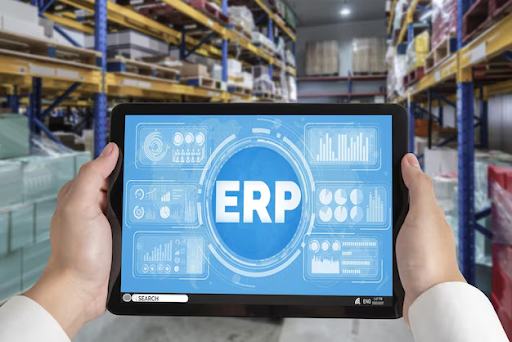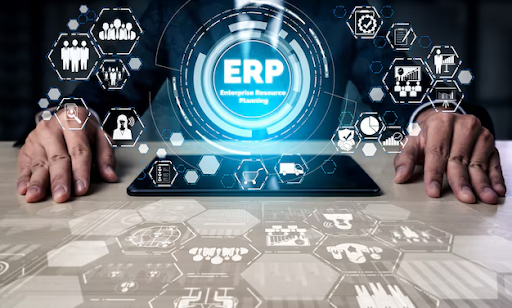Introduction to ERP software in manufacturing enterprises
ERP software (Enterprise Resource Planning) has become an indispensable tool for manufacturing companies in recent years. With the rapid development of technology and the market, manufacturing businesses face increasingly greater challenges in optimizing processes, controlling costs, and enhancing performance. ERP software not only supports the management of all production activities but also provides significant benefits that help businesses enhance their competitiveness and better meet customer demands.
Below are the outstanding benefits that ERP software brings to manufacturing enterprisenterprises:
1. Automating and optimizing the production process

Automating the production process
One of the greatest benefits of ERP for manufacturing businesses is the ability to automate complex processes. From production planning, material management, production line coordination to monitoring machine status, ERP helps reduce manual intervention, thereby increasing accuracy and saving time.
In recent years, with the development of Internet of Things (IoT) technology, ERP has the capability to integrate smart devices to monitor production activities in real-time. This helps businesses easily control the process, detect issues early, and quickly adjust to avoid production disruptions.
Optimizing resource utilization
ERP software helps manufacturing businesses optimize the use of resources such as labor, raw materials, and equipment. Thanks to providing accurate data on the required amount of raw materials, production time, and machine status, ERP helps businesses plan more effectively, avoid resource waste, and minimize waiting time between processes.
2. Effective inventory management

Accurate inventory control
Inventory management is one of the major challenges for manufacturing businesses, especially when it comes to ensuring sufficient raw materials for production without creating excess inventory. ERP helps businesses track and control inventory accurately in real-time. Thanks to the alert feature when inventory exceeds or falls below the threshold, businesses can adjust their purchasing and production plans in a timely manner.
Optimizing the supply chain
ERP software allows businesses to monitor the entire supply chain, from ordering raw materials to transportation and delivery. This helps minimize the risk of material shortages or delayed deliveries, while also optimizing transportation and storage costs. Especially with the development of cloud-based ERP solutions, businesses can manage their supply chains flexibly from anywhere, as long as they have an internet connection.
3. Enhance the ability to make accurate decisions based on data.

Detailed report and analysis
ERP provides detailed reports and data analysis on all aspects of the production process, from finance, inventory, and production to the performance of each department. These analytical tools help businesses track key performance indicators (KPIs) and make decisions based on accurate data. Instead of relying on assumptions or outdated data, manufacturing businesses can make quicker and more accurate decisions thanks to ERP.
Forecasting and strategic planning
With the development of AI (Artificial Intelligence) and Machine Learning technology today, modern ERP systems can analyze past and present data to predict future trends. This helps manufacturing businesses predict market demand, plan production efficiently, and optimize supply chain processes, thereby increasing their competitiveness in the market.
4. Strengthen cooperation between departments

Link and share information
One of the challenges for manufacturing businesses is the lack of information linkage between departments such as finance, production, purchasing, and sales. When departments operate independently, information can be delayed or inaccurate, making decision-making difficult. ERP software helps businesses connect and share information between departments smoothly, allowing all employees and departments to access the same accurate and up-to-date data source.
Real-time collaboration
With modern ERP solutions, manufacturing enterprises can use real-time collaboration tools. This helps the departments work together more efficiently, from the production planning stage to managing delivery schedules. Smooth collaboration helps minimize downtime and ensures that all processes run smoothly.
5. Effective production cost management

Strict cost control
Managing production costs is a crucial factor that determines a company's profitability. ERP software helps track all costs related to the production process, from raw materials and labor to operating expenses. Thanks to its detailed cost analysis capabilities, ERP helps businesses better control costs and detect unnecessary expenses early to provide optimization solutions.
Reasonable product pricing
With ERP, manufacturing enterprises can easily track and calculate costs for each product in detail. This helps them to price their products reasonably, ensuring profits while maintaining competitiveness in the market. At the same time, businesses can easily adjust their pricing structure when there are fluctuations in raw material costs or market demand.
6. Ensure regulatory and quality compliance

Compliance with production and environmental rules
Manufacturing businesses often have to comply with strict regulations regarding production, labor safety, and the environment. ERP software provides tools to monitor and report these standards, helping businesses easily meet regulatory requirements. Thanks to that, businesses can avoid risks related to regulatory violations and protect their brand reputation.
Ensuring product quality
ERP also helps businesses manage product quality from the production stage to the final product. By monitoring the production process and quality control at each stage, businesses can detect and address production errors early, ensuring that the final product always meets the highest standards.
7. High scalability and flexibility

Flexible ERP for manufacturing enterprises
With flexible scalability, ERP software can easily adapt to the changing needs of manufacturing businesses, from small to large scale. When a business expands, ERP can add new modules or integrate with other systems without disrupting current operations.
Cloud-based ERP
Cloud-based ERP has become popular in recent years due to its flexibility and cost-saving capabilities. Manufacturing enterprises can access the ERP system from anywhere, managing production processes, inventory, and supply chains remotely without needing to invest heavily in server infrastructure.
Conclusion
ERP software brings significant benefits to manufacturing businesses, from automating processes and managing inventory to enhancing decision-making capabilities and controlling costs. With the increasing development of cloud technology and artificial intelligence, ERP continues to be an indispensable tool to help manufacturing enterprises optimize operations, enhance competitiveness, and achieve sustainable development.
The implementation of ERP not only helps businesses improve performance but also ensures they are ready to tackle new challenges and opportunities in the 4.0 technology era. Currently, there are many units implementing ERP software for production, from large to small scales, such as Sota Solutions, to ensure that businesses do not need to worry too much about technology issues and can focus on strategic decisions for their enterprises.